The ball game appears to be over for the global objections to the Microsoft/Activision merger. After a series of setbacks for antitrust enforcers last week, the merger is set to close in the near future. But the lesson for policymakers might be to pursue a regulatory alternative in the effort to control harmful vertical tech mergers.
Judge Jacqueline Scott Corley, a recent Biden appointee, wrote the district court opinion last week that rejected the Federal Trade Commission’s (FTC) complaint against the merger. The opinion holds that the FTC had been unable to prove that Microsoft would have a real incentive to withhold the enormously popular game, Call of Duty, from other platforms after the merger. And so, the merger would not be likely to substantially lessen competition in the different video game markets.
Some legal scholars said she got the legal standard wrong. Judge Corley said it was not enough for the FTC to argue that “a merger might lessen competition – the FTC must show the merger will probably substantially lessen competition.” But the Clayton Act requires the FTC to prove the proposed deal “may” harm competition, not that it “will.”
But that verbal slip was not determinative. Judge Corley’s opinion is in line with much current antitrust jurisprudence in imposing a very high burden of proof on an antitrust agency seeking to block a merger, especially a vertical merger. And, on July 14, the Ninth U.S. Circuit Court of Appeals agreed with her reasoning and rejected the FTC’s appeal to pause her decision.
In addition Microsoft and Sony signed a binding agreement on July 16 to keep Call of Duty on PlayStation for 10 years following the acquisition. Microsoft had already signed 10-year licenses for Activision games with some other companies, including Nintendo. Sony’s acceptance of this offer, which it had declined earlier, suggests that it has recognized the writing on the wall and decided to take its best deal in the absence of antitrust action to block the merger.
In the United Kingdom, the Competition and Markets Authority (CMA), which had objected to the deal, agreed with Microsoft to delay appeal proceedings at the Competition Appeal Tribunal, pending negotiation of a deal that would address its concerns. Perhaps the CMA will accept the merger provided the 10-year license agreement to keep Call of Duty available on PlayStation is a condition of the merger, not merely a voluntary business agreement. But it no longer seems likely to block the merger.
The initial deal signed 18 months ago stipulated that if the transaction were not completed by July 18, 2023, Microsoft would have to pay Activision a $3 billion breakup fee. But last week the companies extended the deadline to close their deal until October as they work to settle regulatory concerns.
A trial before an FTC administrative law judge (ALJ) had been scheduled to begin on August 2, 2023. But the ALJ court has no power to halt the merger, and so on July 20, the FTC paused this in-house trial. Even though the FTC’s loss is only on the issue of a stay, it is probably going to end its attempt to block the merger as it did after losing its attempt to block Meta’s merger with the VR game developer Within.
Some lessons
Some commentators, such as entrepreneur Scott Galloway, say one lesson is that FTC Chair Lina Khan must be more cautious. We have an inexperienced agency head, goes the thinking, who is taking excessive legal risks. These commentators point out that the effectiveness of the FTC is based on industry fear that the agency will win if it must go to court. They also point out that she tried and failed to block the Meta merger with Within and now she has had this new setback. If this losing streak keeps up, they think businesses will lose their respect for the FTC and mergers will soar.
This recommendation from these commentators for more caution might underestimate the very real accomplishments of more stringent merger reviews. The willingness to file these challenges has had and will continue to have a deterrent effect. The Microsoft Activision deal was announced 18 months ago. As The Economist notes, an 18-month delay “would be enough to chill future dealmaking.” Not many companies will wait 18 months to close a deal in the face of international regulatory objections that are removed only at the eleventh hour.
It is true that heightened antitrust scrutiny of mergers has not deterred some companies from proposing questionable deals. For instance, even though it ultimately had to accede to a court order to unwind its involvement in the Northeast Alliance with American Airlines, Jet Blue felt comfortable seeking to acquire Spirit while still under challenge from the Department of Justice (DOJ) regarding that alliance. Moreover, the number of mergers has held steady. These facts suggest that more stringent merger reviews have not been effective in deterring questionable mergers.
Still, more stringent merger reviews at DOJ and the FTC have meant a decline in the pace of large mergers. As The Economist also notes, the average value of mergers has shrunk by about 40% in the last year compared to the past five years. The DOJ and the FTC are far from being toothless tigers, even when they ultimately lose in court. Continuing their tough stance against problematic mergers will likely continue to deter companies.
In addition, FTC Chair Khan is acting in line with a new understanding among antitrust enforcers of the risks of mergers, including vertical mergers. It is worth remembering that the Trump Administration’s DOJ brought its own vertical case in 2017, this one against AT&T’s acquisition of Time Warner. The antitrust agency worried that, because AT&T owned DirecTV, it would take its newly acquired must-have programming off rival cable services including HBO and CNN. This was the same vertical concern that motivated the FTC’s challenge to the Microsoft Activision deal. But DOJ lost in court and the merger went through in 2018.
Despite these court losses, worries over vertical combinations are extremely intuitive. It is just common sense that a large distributor will withhold product from its competitors if it can. Traditional antitrust wisdom followed this idea and sought to control that anticompetitive conduct by refusing to allow integration between key distributors and producers.
The Borkian revolution in antitrust in the 1980s reversed that presumption and taught that vertical mergers were almost always benign. However, much recent antitrust commentary on the measurement and effects of vertical mergers (see Serge Moresi & Steven C. Salop and Marissa Beck & Fiona M. Scott Morton) backs up the traditional intuition that vertical mergers are often anticompetitive and rebuts the idea that they should be considered presumptively benign.
Antitrust agencies are increasingly taking this view. In addition to its cases, in 2021 the FTC withdrew its lenient vertical merger guidelines, citing their reliance on “unsound” economic theories. On July 19, the FTC and the DOJ issued new draft merger guidelines that more realistically take into account the evidence that past approved mergers have led to a loss of competition. Guideline 6 states that vertical mergers “should not create market structures that foreclose competition.”
The problem is with the courts. In the end, judges approve or reject cases brought by antitrust enforcers. Antitrust activist Matt Stoller rightly points out that President Biden’s commitment to a robust antitrust agenda hasn’t included appointing judges who share a similarly progressive view of antitrust laws. But this is urgently needed if the new thinking about the harms of mergers is going to prevail. The extraordinarily high burden of proof in merger cases is judge-made law, made under the influence of Robert Bork’s outdated antitrust framework. It can be undone by appointing judges who would effectively operate under a burden of proof that properly considers the Clayton Act concern about the concentration risks and tendencies attendant to large mergers.
Of course, Congress could act to adjust the Clayton Act standard for merger review. In 2021, Senator Amy Klobuchar proposed a new standard for mergers. It would bar mergers that “create an appreciable risk of materially lessening competition,” rather than mergers that “may substantially lessen competition,” where “materially” is defined as “more than a de minimus [sic] amount.” The intent of Senator Klobuchar’s bill was that, by reemphasizing the Clayton Act’s concern with the risks that large mergers lead to concentration, the updated standard would allow enforcers to “more effectively stop anticompetitive mergers that currently slip through the cracks.” Such a new standard might also force judges to look more favorably on agency efforts to rein in mergers, as the framers of the Clayton Act intended.
But, in the short-term, Congress is not likely to be a source of antitrust reform. Representative David Cicilline, head of the House Antitrust Subcommittee until this year and a leader of the antitrust reform effort last year, has retired. Representative Jim Jordan, the new Republican chair of the House Judiciary Committee, is hostile to Chair Khan’s stewardship of the FTC, as evidenced most recently by his tough questioning at an oversight hearing last week, and he is certainly no friend of antitrust reform. This week he signed a letter with 21 other House of Representative Republicans praising the Microsoft/Activision merger as “procompetitive,” endorsing the outmoded Borkian antitrust framework that has dominated antitrust jurisprudence for decades, and rejecting progressive reforms as “anti-consumer, anti-innovation, and anti-American.” Antitrust reform bills stalled in the Senate last year and there is no sign of resurrection.
The regulatory alternative
So, for the foreseeable future, cases attacking vertical mergers like the one between Microsoft and Activision, face an uphill battle under current antitrust jurisprudence. Yet common sense, the traditional antitrust view, current scholarship, and recent antitrust agency actions concur in the view that government must control these vertical arrangements if markets are to remain open and competitive.
This thinking was at the heart of the old measures to control vertical integration in television. The Federal Communication Commission’s (FCC) rules on financial interest and syndication blocked integration of TV production and the three major TV networks. Adopted in the 1970s, they were designed to weaken the control that the three broadcast TV networks had over television content by spurring the development of independent producers and distributors of television programs. They were repealed in the early 1990s in a Seventh Circuit Court of Appeals decision written by Judge Robert Posner that is a model of Borkian antitrust analysis. Mergers between the major TV networks and Hollywood production studios soon followed.
The key to this approach to vertical integration was a decentralized market structure created and maintained by an industry regulatory agency. The DOJ put in place a supplementary antitrust consent decree, but the design, supervision, and enforcement of the regulatory controls rested with the FCC. The rules worked for decades to control integration in the television industry and allowed a more open market to develop and sustain itself.
Such a regulatory approach might be an effective way forward if policymakers want to control vertical integration in tech. Antitrust reform is certainly desirable, but it would still leave implementation and enforcement of vertical controls in an uncertain state. Ongoing regulatory supervision would simultaneously provide more flexibility and greater certainty of enforcement.
As I argue in my forthcoming book from Brookings Press, Regulating Digital Industries: How Public Oversight Can Encourage Competition, Protect Privacy, and Ensure Free Speech, and as proposed in legislation introduced by Senator Michael Bennet, an agency with authority over tech companies should be empowered to set rules governing tech company behavior. These rules could include whether these companies should be allowed to engage in exclusive vertical arrangements, either through acquisition or contract.
Creating such a regulatory structure for tech might not be on the political agenda in this Congressional session, but it should be a long-term vision for those interested in promoting and maintaining tech competition.
-
Acknowledgements and disclosures
Microsoft, Meta, and AT&T are general, unrestricted donors to the Brookings Institution. The findings, interpretations, and conclusions posted in this piece are solely those of the author and are not influenced by any donation.
The Brookings Institution is committed to quality, independence, and impact.
We are supported by a diverse array of funders. In line with our values and policies, each Brookings publication represents the sole views of its author(s).

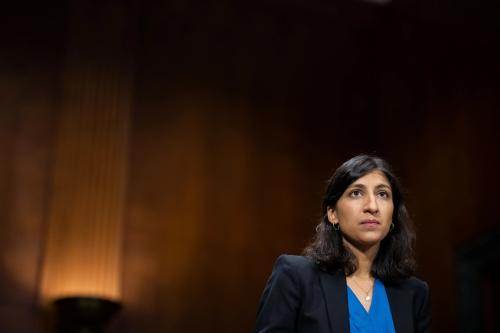
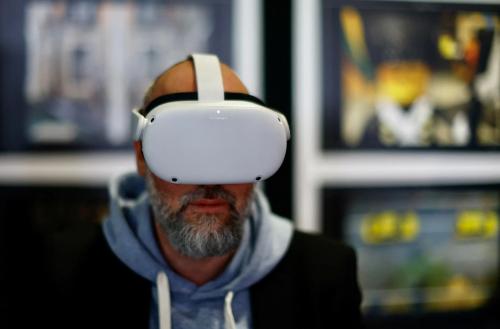
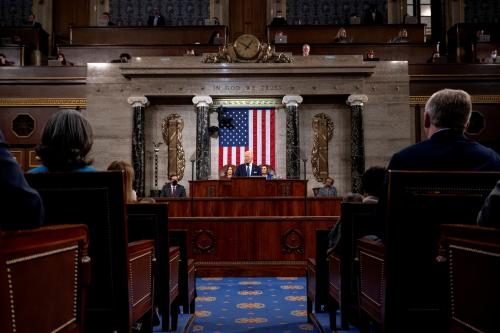


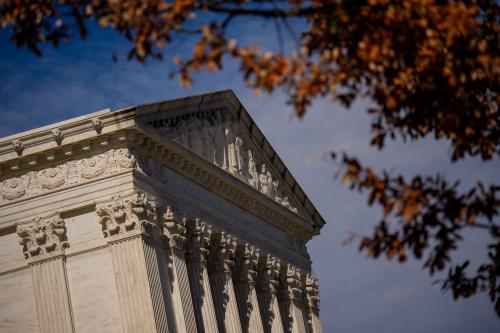
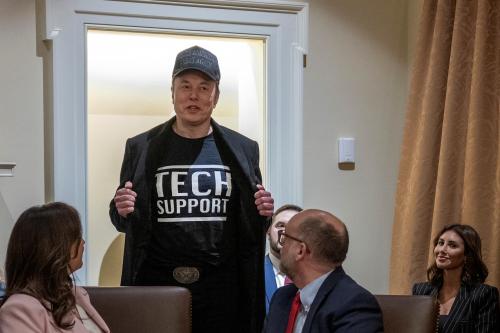
Commentary
Does tech need a regulatory antitrust alternative after the Microsoft-Activision decision?
Tuesday, July 25, 2023